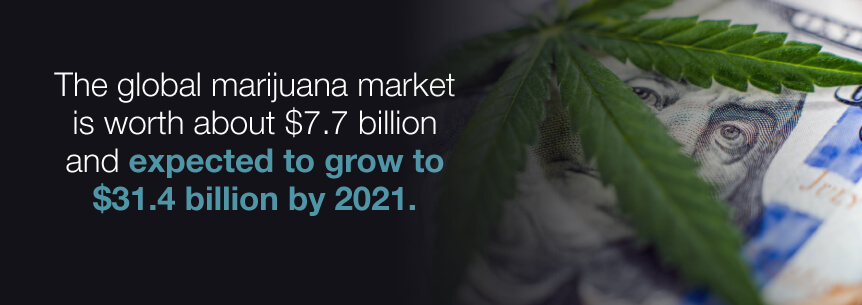
Marijuana legalization is spreading rapidly across the United States and the globe. Medicinal marijuana is now legal in 29 states plus the District of Columbia, and recreational use is legal in nine states plus D.C. Public opinion about weed is changing too. Sixty-four percent of Americans, including folks with both liberal and conservative political opinions, support legalization. The growing amount of evidence that shows how the substance can treat a wide range of medical conditions is likely playing a large role in causing this shift. Things seem to be looking up for the cannabis industry.
While the situation seems to be improving, cannabis enterprises are still facing some significant hurdles. Weed still isn’t legal on the federal level, which makes operating a weed business more complex and brings a level of uncertainty to the industry. One major impact is that dispensaries don’t have access to many of the same financial resources other businesses do, putting them at a disadvantage. Although the global market is worth about $7.7 billion and expected to grow to $31.4 billion by 2021, it still desperately needs financial solutions to get it on an even playing field with other sectors.

One such solution the industry is currently trying is the use of cryptocurrencies such as Bitcoin, as well as pot-specific currencies, to facilitate transactions.
Because marijuana is still illegal on the federal level, despite being legal for medical use in more than half of states, most banks will not work with cannabis enterprises. The number of banks that will is growing and is estimated to now be around 500, but the pot industry is locked out of using the majority of institutions, especially the major ones.
Why won’t banks work with marijuana companies? Doing so would be a risk for them. They worry they’ll get into legal trouble, which could, in theory, happen in the event of a federal crackdown. Under a strict interpretation of the law, providing financial services to a cannabis company might even be considered money laundering.
Because they don’t have access to banks, they don’t have many of the merchant services most other businesses rely on. There’s no store identification for a dispensary like there is for other types of enterprises, which means they can’t accept credit and debit cards. It’s also much more difficult for weed entrepreneurs to get loans to get their companies off the ground, and they often can’t start lines of credit. Cannabis enterprises are often even unable to access basic services, like opening a checking account.
Cannabis companies have tried various alternatives. In 2014, a mobile app payment company called SinglePoint put terminals in medical weed dispensaries to allow customers to use their debit cards. It worked for a while, but then the banks shut them down because they didn’t want to take the risk. Most banks don’t want anything to do with marijuana, so the weed industry started looking for alternatives with no connections to banks. That’s where cryptocurrencies come in.
To understand why cryptocurrencies could be the solution to the cannabis industry’s financial challenges, we need to know what cryptocurrencies are and how they work.
Cryptocurrencies are digital currencies that are made from code and have no physical form. They use encryption to control the creation of currency units and verify transactions. They operate independently of any central authority. Instead, every peer in the network has a record of transactions and must agree on a transaction for it to be valid. Once a transfer is confirmed, no one can change it. It’s permanent.
Cryptocurrency “miners” — which can be anyone — confirm transactions by using their computers to solve a cryptographic puzzle. The answer to that puzzle is what allows the record of the transaction, called a block, to connect to the blockchain, the network that facilitates the use of cryptocurrencies.
Basically, cryptocurrencies:
The most famous cryptocurrency is Bitcoin, which was also the first to be invented. In 2008, an unknown entity going by the name Satoshi Nakamoto created a decentralized, peer-to-peer digital cash system, which led to the creation of Bitcoin. The price of Bitcoin started at $0, but today its value fluctuates at higher price points, with nearly 17 million coins in circulation after recently experiencing rapid growth.

Other cryptos have since emerged. Ethereum has a market cap of $103 billion compared to Bitcoin’s $188 billion, a price of more than $1,000 and around 97 million units in circulation. There are a huge number of other cryptocurrencies in existence, too. Some other top players include Ripple, Bitcoin Cash, Cardano, Stellar and Litecoin.
You can also now buy and trade cryptocurrencies made specifically for certain industries, including the marijuana industry. The top cannabis crypto is currently PotCoin, which has a market cap of around $51 million and is ranked 262nd in terms of market cap among all cryptocurrencies, of which there are more than 1,000. That’s a huge increase from its market cap of $81,547 in February 2014 just after its launch. Besides being the top pot-focused cryptocurrency, PotCoin also made headlines for reportedly funding one of former NBA star Dennis Rodman’s recent trips to North Korea.
PotCoin is far from the only marijuana-focused cryptocurrency, though. Here are some of the other top-performing ones:
Are cryptocurrencies the right way for the legal weed industry to deal with the financial hurdles it faces? This question has sparked some debate, so let’s look at some of the pros and cons.
Here are some of the benefits of using cryptocurrencies in the cannabis industry.
Since most dispensaries can’t currently accept debit or credit cards, those that don’t use cryptocurrencies can only accept cash. Cannabis enterprises are forced to have large amounts of cash on hand at all times, which creates a security risk. Criminals would likely know this, making these businesses a prime target. If a robbery occurs at the end of the day, a business could lose 100 percent of the money it earned that day.
Given that marijuana is a nearly $8 billion industry, dealing exclusively in cash is a massive market-wide risk. Using Bitcoin, PotCoin or another digital currency reduces the amount of cash a dispensary has on hand, which means there’s less cash at risk of getting stolen. Cryptocurrencies are highly traceable, and no central authority can manipulate them, providing a high level of accountability and security.
Cryptocurrencies also keep users’ identities hidden. You can analyze a transaction, but you can’t trace it back to users’ real-life identities. You can’t do so through their account, either. This anonymity could be a plus for those who want to buy medical or recreational marijuana, but want to do so discreetly. Some might want to do this for fear of a government crackdown, or for other personal reasons. Although the transactions take place entirely digitally, users don’t have to worry about their personal information getting out into the world.
While these digital currencies protect users’ privacy, on another level, they can create more transparency in the industry, which can help marijuana-related businesses adhere to regulations. For the sale of marijuana to remain legal, there needs to be a high degree of accountability, and various checks must take place as the product moves from grower to dispensary to the end user. Since the blockchain automatically keeps a secure, transparent and unchangeable record, it’s perfect for keeping track of the necessary information to demonstrate every step of the process adhered to regulations.
Marijuana and blockchain could record or store information related to:

In addition to improving adherence to regulation and security, this information could help businesses improve their supply and demand projections, which, in turn, would lead to better inventory management and a better bottom line for weed businesses. Even large corporations like IBM have advocated for the use of blockchain to improve transparency in the weed business.
While some customers might not mind using cash to buy their marijuana, it might deter some, and it doesn’t hurt to have another payment option. Many people don’t carry much cash anymore, so by not accepting any other form of payment, dispensaries might be missing out on people who would otherwise have bought from them. Adding another form of payment could make purchasing weed more convenient for some customers and lead to more business and higher profits for cannabis enterprises.
Skeptics of using cryptocurrency in the marijuana industry have leveled some criticism about the practice. Let’s explore some of those concerns.
The marijuana business is just starting to gain some legitimacy. It’s slowly becoming legal in more places, and public opinion is shifting in its favor, but it’s still illegal in many states and at the federal level. Cryptocurrency just recently made its way into the public eye and is starting to become more accepted. However, many people still don’t understand it and see it as somewhat risky. It’s completely unregulated, and it’s so new we can’t be totally certain about its future. Both the marijuana and the cryptocurrency sectors operate on the edge of legitimacy.
Because of the uncertain legal issues surrounding the sale of marijuana, the industry is trying not to attract any negative attention, especially from the federal government. It wants to prove it’s a legitimate industry that’s good for the economy and for U.S. citizens. It wants the federal government to legalize it so it can really start to take off by gaining access to the financial services other businesses have.
Partnering with another sector lawmakers are skeptical of is not what the weed industry needs right now, critics say. Some think the industry should prioritize appearing legitimate over fixing its financial services access problems. Once the federal government legalizes the sale of marijuana, these issues will be resolved anyway, they argue. Some also fear the widespread use of cryptocurrencies could attract more scrutiny from the government and possibly lead to a crackdown.
Dispensaries pay exorbitantly high taxes, as much as 65 to 75 percent, according to the New Federalism Fund. That’s because they often pay penalties for submitting their taxes in cash, which they’re forced to do. They also can’t deduct business expenses, since the federal government doesn’t see them as legitimate businesses. Some worry that using cryptocurrency could make taxes for marijuana businesses even more complex. The Internal Revenue Service recently ruled cryptocurrencies are property, not currency, making them more like stocks than traditional income. Buying marijuana using Bitcoin, therefore, is a taxable event that requires the buyer to keep records and pay taxes as they would if they had just sold a stock.

Some stakeholders also have more general worries about the future of Bitcoin and other cryptocurrencies. Since the use of these digital assets is so new, we don’t really have any assurance of how the situation will play out. Some economists predict Bitcoin may soon experience a bubble. The government may enact regulations that cripple the crypto market. Using digital currencies might not catch on as much as some people hope and remain more of a fringe trend.
Because cryptocurrency is uncharted territory and its future is uncertain, many don’t want to pin all of the marijuana industry’s hopes on it. If it does, and cryptocurrencies go down, the weed industry could go down with it, especially since it’s already at risk due to legal uncertainties.
Since cryptocurrencies, legal marijuana and the intersection of the two are so new, it’s difficult to say what the future will hold for them. It does, however, seem they will have a substantial impact on each other. So, what can we expect?
There’s always the possibility the federal government could choose to crack down on the marijuana industry. It’s more likely, though, that more states will continue to legalize it and that the federal government will leave the issue largely up to the states. The federal government might eventually come around to legalization, but that will likely be a long process.
The government could also theoretically start to impose regulations on cryptocurrencies. While it’s uncertain exactly what those rules would do, it could change how they operate in some form. They might become more mainstream, or they might run into some serious legal trouble.
Before any of that happens, though, the government might also introduce legislation that helps dispensaries with their tax and banking issues. Lawmakers were considering attaching an amendment to the tax bill that would allow marijuana enterprises to deduct business expenses. Although those plans seem to have been shelved for now, they might resurface soon.
Because the government is not familiar with cryptocurrencies, they may introduce legislation that would allow marijuana-related companies to use banking services in an effort to make these transactions easier for regulators to track. There’s also the chance they could use blockchain to track them, but this might not happen until blockchain and cryptocurrencies are more mainstream technologies.
Technologies might also emerge from the private sector to help customers buy marijuana using digital assets. For example, a company called POSaBIT has started placing kiosks in dispensaries. Shoppers can use their credit cards to buy Bitcoin at the machine, which they can use to buy cannabis products. Then, POSaBIT takes the Bitcoin from the dispensary and exchanges it for U.S. dollars. To take care of regulatory and security concerns, the machine requires you to present a valid ID before using it and has a nine-point fraud prevention system.
POSaBIT enables customers and dispensaries to use Bitcoin without having to really know how it works or even spend too much time handling it. Perhaps we’ll start seeing more of these intermediary services popping up.
Of course, another possible solution is that more dispensaries start accepting cryptocurrencies directly from their customers. Marijuana and cryptocurrencies do seem to be a perfect fit in many ways, despite some uncertainty. We’ll just have to wait and see how their shared future unfolds.
Want to learn more about the marijuana industry and keep up with the latest news? Sign up for our newsletter. You can also use our site to search for a medical marijuana doctor or dispensary in your home state
No Information on MarijuanaDoctors.Com should be used to diagnose, treat, prevent or cure any disease or condition. You can view our Full Disclaimer here.